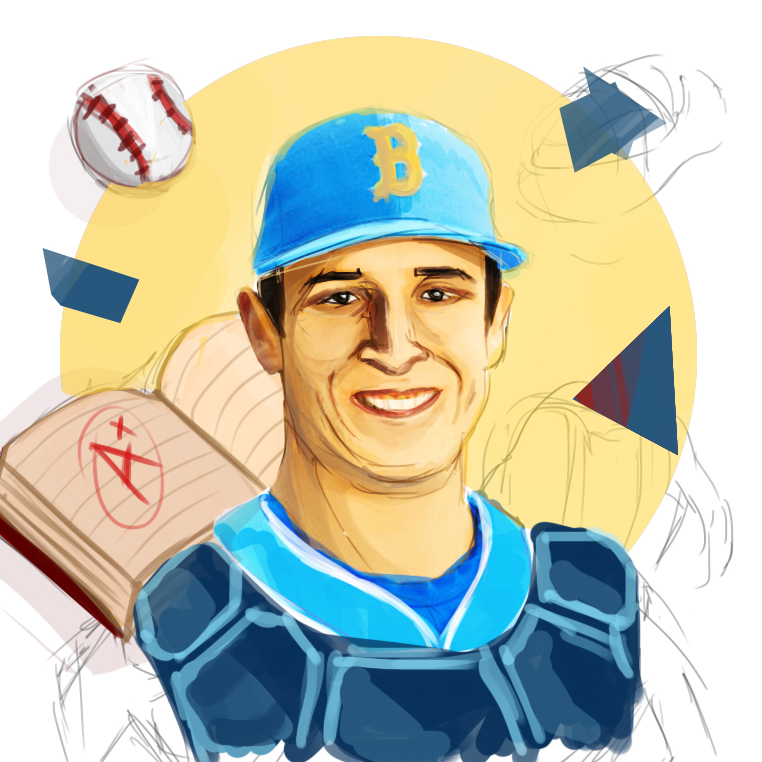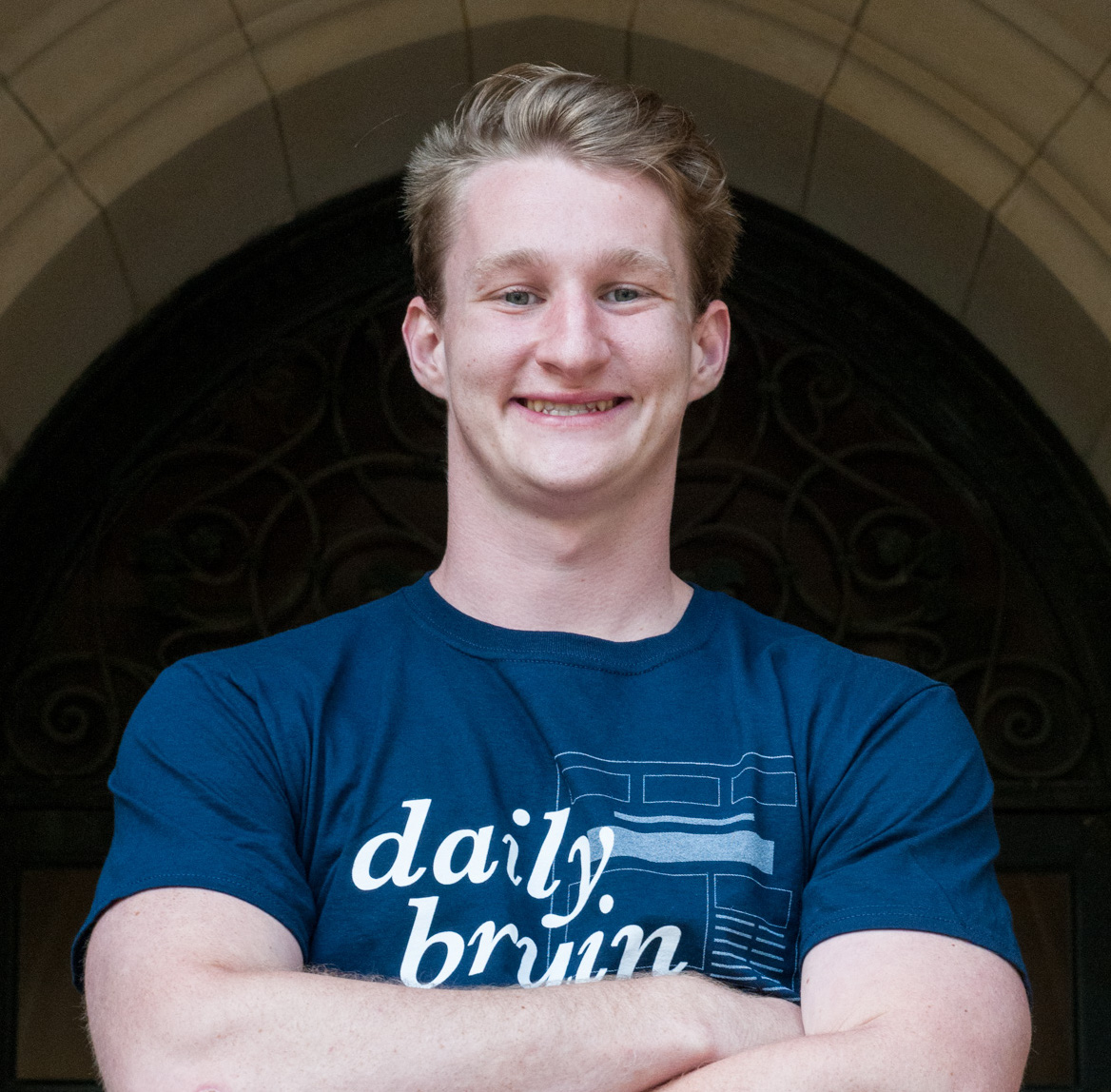Walk-on catcher Daniel Rosica enters spotlight in 2016 season

(Harishwer Balasubramani/ Illustrations director)

By David Gottlieb
June 5, 2016 1:57 p.m.
The first catcher on the depth chart wasn’t going to be able to play. The second catcher on the depth chart quit. That left UCLA baseball with options three and four.
Redshirt junior Darrell Miller Jr. – the team’s projected starting catcher – had his collegiate career cut short by a labrum tear just two weeks before the season. Freshman Michael Benson – California’s third-best high school catcher in the 2015 class – opted to play at a junior college, compromising the Bruins’ depth.
Coach John Savage was left with Jake Hirabayashi, a freshman who had no prior catching experience but had some upside offensively, and redshirt freshman Daniel Rosica.
“The Rosica story,” Savage said before the season began. “That could be Rudy.”
Savage compared Rosica to Jerry Neuheisel – both players who knew the system but were unlikely to play.
His 2140 SAT score and 3.97 unweighted high school GPA – 4.50 weighted – were what brought him to UCLA. An injury, a player quitting and some mid-season adjustments were what brought him behind the plate at Jackie Robinson Stadium.
–––
Baseball and academics gave Rosica two avenues for success in high school. As his junior year approached, he honed in on one.
“I kind of decided with my parents that I was going to focus on academics,” Rosica said. “And then try to walk on to which ever school I chose and see if it worked out. If it didn’t work out, then I would just move on and start my real life.”
Rosica only played two years of varsity baseball. He went to showcases earlier on in his high school career, but said he absolutely hated the process.
“Me, I’m not like a super physical specimen, so I’m not hitting home runs, I’m not outrunning guys,” Rosica said. “I wasn’t really attracting too much attention from coaches, especially in those one-day showcase deals.”
Rosica, who is listed at 5-foot-11 and 180 pounds, said he was not a standout on his high school team. He only took hold of the starting catcher’s job at the tail end of his junior year. He would keep the job throughout his senior year, batting ninth.
He earned the trust of his coaches, who even allowed him to call his own games, but no Division I program was about to offer Rosica a letter of intent.
But he didn’t need one.
Rosica is one of the rare Division I athletes who applied and got into college just like an ordinary student. He applied to about 10 engineering schools, getting into UC Irvine, UC San Diego and UC Santa Barbara. He didn’t get into Stanford or Vanderbilt. The Commodores would win the College World Series just months after rejecting Rosica.
Savage called Rosica a no-brainer to go play baseball for an Ivy League school, but that’s not where the Fountain Valley, California, local wanted to be.
“I looked into that a little bit, but the (the Ivies) can’t really beat SoCal,” Rosica said. “I didn’t want to leave.”
A couple of Rosica’s high school friends are playing Division I baseball now. They signed their letters of intent on National Signing Day, but Rosica would have to wait several months before he could make his decision.
“I remember I had a game,” Rosica said. “All my friends and my parents and their parents went out to dinner, and I just went straight home to check if I got into UCLA.”
Rosica had completed half of the goals he had set out for himself before his junior year of high school. His academics got him into the prestigious engineering school in Westwood. Now it was time to walk on.
Savage said that hardly anyone just comes out of the blue, but Rosica was as close as it gets. Rosica never had to try out, all because of a few phone calls.
“I had a couple calls from guys that I trust,” Savage said. “‘This guy won’t play for you,’ they told me. ‘And he will be an unbelievable bullpen catcher.'”
When Savage went to see Rosica play, he saw that the high school backstop could catch and throw the ball back to the pitcher in the bullpen, but he said that was where it ended.
Rosica spent his entire freshman year in the bullpen, listening to Savage and learning the system. He worked with James Kaprielian, a first-round pick by the New York Yankees in 2015, and David Berg, who was picked five rounds later by the Chicago Cubs.
Coaches told Rosica that his main goal was to help the pitchers improve and to be America’s best bullpen catcher. Playing time was all but off the table, but Savage said there was still a possibility that Rosica could play senior year.
“The fact that he left it open just a little bit,” Rosica said. “Even though it didn’t seem like he believed the words that he was saying, kind of gave me a little confidence.”
When Miller went down, Rosica had a shot.
Rosica had already begun to fight for the backup spot. He figured that because Miller wasn’t very fast, he might be able to pinch run and stay in the game to catch a couple innings.
When Miller had surgery just weeks before the season, Rosica wasn’t fighting for a backup spot anymore. He was fighting to be the starting catcher on the UCLA baseball team.
Because Hirabayashi had never caught before, he got more reps during intersquad play than Rosica. Hirabayashi’s high school resume – four varsity years at Notre Dame High School – also gave him an edge.
When the season started, the two split time. Hirabayashi got a little higher share of the playing time for the first six weeks of the season, but he began to struggle offensively, collecting just two hits in his first 38 at-bats. Rosica felt like he was struggling at the plate, too.
“I was kind of a non-factor offensively,” Rosica said. “It was kind of building up a little frustration. Not too much, because everybody was telling me: defense, defense, defense. Whatever you do offensively is a bonus.”
Then he turned it around. Rosica cites the series against Oregon as his season’s pivotal series. In the three-game set he went four for 11.
“Jake and I always alternated on the weekend,” Rosica said. “Then when I caught Friday, Saturday and Sunday (against Oregon) I kind of realized, OK, I’m the catcher now.”
Rosica said the adjustment had less to do with mechanics than it did with seeing more live pitching. Whatever it was, it worked. From game one of the Oregon series through the last game of the season, he hit .313.
He took one day off the whole rest of the season. Rosica had won the job.
–––
Rosica’s Rudy-like narrative was a bright spot in an otherwise disappointing season for the Bruins, who finished second-to-last in the Pac-12 and missed the playoffs.
His .264 batting average ranked sixth on the team, meaning he out-hit veterans like junior Brett Stephens, senior Trent Chatterton and redshirt senior Christoph Bono. His defense was serviceable, throwing out 34 percent of would-be base stealers, not far off from the Pac-12 average of 36 percent.
His academics are still in order. He’s an economics student now and he hopes to add another major – psychology.
So how does he feel?
“I want to say that my parents are a little happier than I am,” Rosica said. “I played, but that wasn’t really the goal. … It was a pretty bad year.”
This could be Rosica’s only year getting significant playing time. To a highly touted catching prospect, UCLA’s program would be very attractive because of a history of success and the lack of depth – a freshman could play right away.
The Bruins are bringing in three catchers for next year, Savage said. That means Rosica could be right back in the bullpen.
“I’m fine with that – to be honest – as long as we have a better season than this year,” Rosica said. “Winning is a lot better than playing.”


